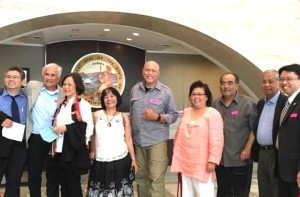Key Calif. body OKs Filipino WWII role’s inclusion in textbooks

The Bataan Legacy Historical Society (BLHS) team (left to right) at the recent May 19, 2016 Instructional Quality Commission (IQC) of the California Department of Education meeting included Prof. James Sobredo, Manuel Bella, Cecilia Gaerlan, Lea Guerrero Carpenter, Ray Cordoba, Jeanette Adi, Steve Arevalo, Rick Villarina and Cirian Villavicencio. JEANETTE ADI
SAN FRANCISCO — A key committee of California’s Department of Education on May 19 approved all of the curriculum recommendations of the Bataan Legacy Historical Society (BLHS), a big step towards making high school students learn of the contributions and sacrifices of Filipinos who fought side by side with Americans during the Second World War.
The unanimous vote of department’s Instructional Quality Commission (IQC) came as a welcome surprise to BLHS Executive Director Cecilia Gaerlan, prime mover of the campaign to revise the history curriculum framework for California high school students.
“I was not in the room and was not sure of the outcome until after I was told of it,” a stunned Gaerlan uttered. “I could not believe it at first until I was literally shown what was voted upon.”
Gaerlan recalled that during the March 24 meeting, the IQC only accepted two of BLHS recommendations including making the point that the Filipinos were part of the U.S. Army. At the most recent meeting, the IQC approved everything that the BLHS recommended, including the point that Filipino troops were part of the US Armed Forces in the Far East (USAFFE).
The revision of the high school history curriculum is now in the final stage, in the hands of the ten members of the State Board of Education (SBE) headed by Board President Michael Kirst. The board is expected to consider the recommendations in July.
Article continues after this advertisementThe BLHS recommendations adopted by the IQC for Grade 11 U.S. history curriculum included the following:
Article continues after this advertisement- Filipinos comprised the majority of the U.S. Armed Forces in the Far East (USAFFE);
- Filipino and American troops of the USAFFE, despite suffering from massive disease and starvation and fighting without any air support, delayed Japan’s 50-day timetable for conquest by defending Bataan for 99 days;
- The Bataan Death March, which forced around 75,000 prisoners to march some 60 miles with no provisions for food, water, shelter or medicine claimed the lives of approximately 10,000 Filipino and 750 American soldiers, while another 20,000 Filipino and 1,600 American soldiers died inside their Camp O’Donnell prison camp;
- the fate of the American soldiers transported in “hell ships” to work as slave laborers;
- the role of Filipino and American guerrillas in liberating the Philippines, in the Battles of Leyte Gulf in October 1944 and the complete destruction of Manila in 1945.
Associate Professor of Asian American Studies Program of Sacramento State University James Sobredo was beside himself with elation that they were able to hurdle the IQC approval stage.
“California textbooks for K–12 will finally allow the Filipino side of the story to receive equal attention. People need to know that more Filipinos died and suffered in during the war and the Bataan Death March,” Sobredo said.
“The significance of (requiring students) to learn that Filipinos were part of the US Armed Forces in the Far East (USAFFE) is that it explains why Filipinos are fighting for US military benefits for Filipino veterans. Also, they should know that Manila suffered tremendously towards the end of the War. Manila was the second most devastated city in World War II,” Sobredo emphasized.
While Gaerlan attributed this recent success to both Filipino and American support, Sobredo acknowledged the tireless efforts of BLHS, particularly Gaerlan.
“The Education Department especially praised BLHS for its dedication and persistence in working with the Instructional Quality Commission and with their complicated process and requirements,” Sobredo stated.
He explained that the BLHS started out not have much experience in the political process, but today they have proved themselves capable of working effectively within the political process.
Gaerlan was quick to caution that only after the curriculum template is created will the lessons on Filipinos in WWII be actually taught.
“In theory, each school district is supposed to create its own curriculum template after the framework is approved,” Gaerlan explained. “However, foreseeing the challenges of doing so, including lack of resources, we will be creating a curriculum template that can be used by the different school districts.”
Gaerlan cautioned further: “The more monumental task is not only in the creation of this template, but also in convincing the high school districts and the history teachers to implement this. Approval of the history curriculum framework is only the beginning. Much more work ahead in the coming years.”
Sobredo added that the process of getting materials approved for K-12 and through the IQC is very slow, cumbersome and, “quite frankly, a bit frustrating.”
“But this is all part of the political process, and it also assures that all voices are heard before the Commission. So, yes, we would like the process to go faster, but that is not the case. Democracy moves along at a very slow pace,” Sobredo lamented.
Sobredo also disclosed that his colleagues at Sacramento State University are already starting work on instructional materials so that when the textbooks are finally approved there are some available.
“For the book chapter that I wrote on Filipinos in California, I made sure that the key points recommended by the BLHS group are also included,” Sobredo disclosed.
Gaerlan the Filipino community for uniting to ensure that the sacrifices of the Filipinos during WWII will be learned by all high school students in California. She also believes that this show of unity proves that the Filipino community can be a formidable political force when members are united.
RELATED STORIES
Fil-Ams press for schools’ study of Filvets’ role in WWII